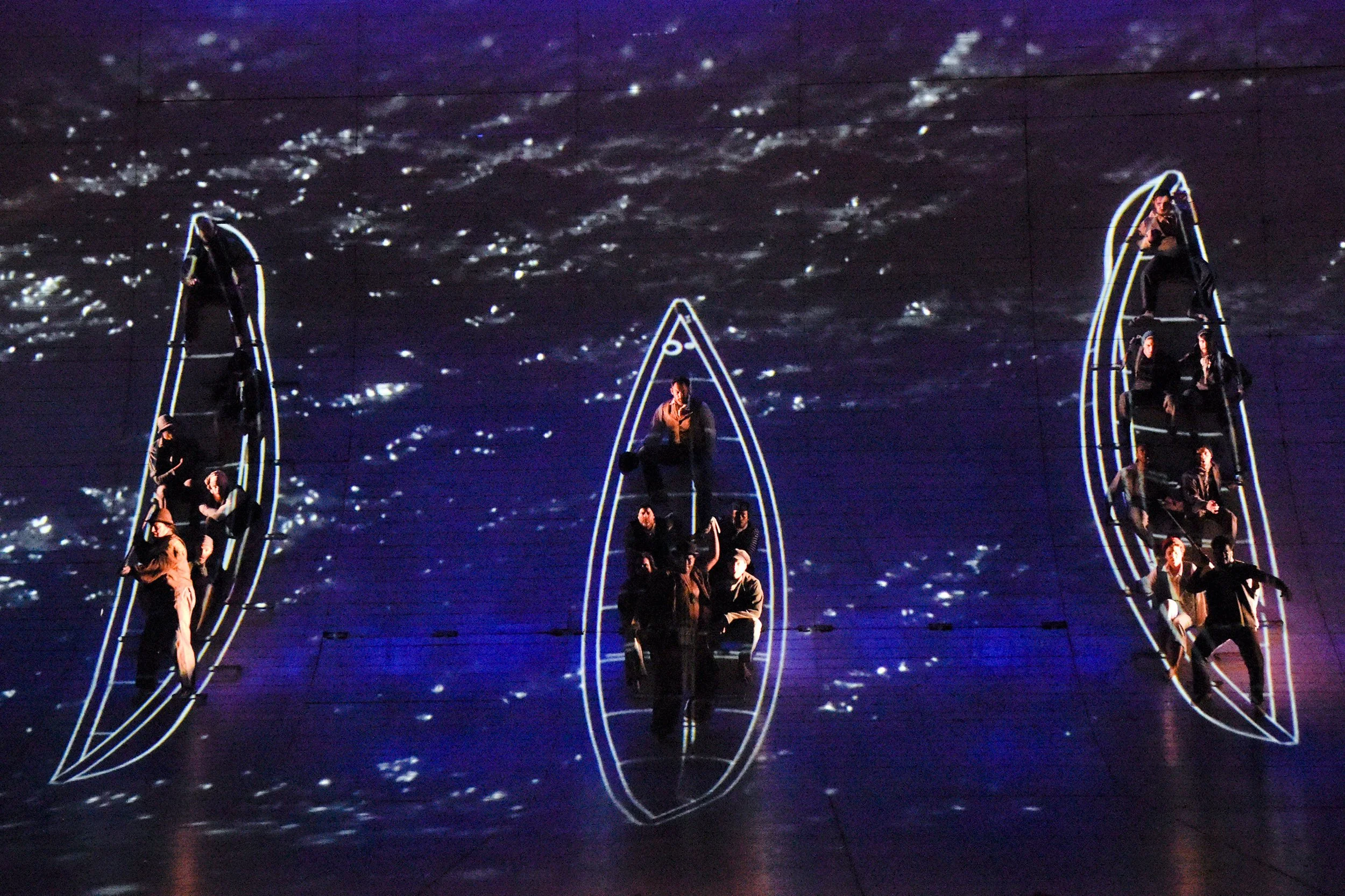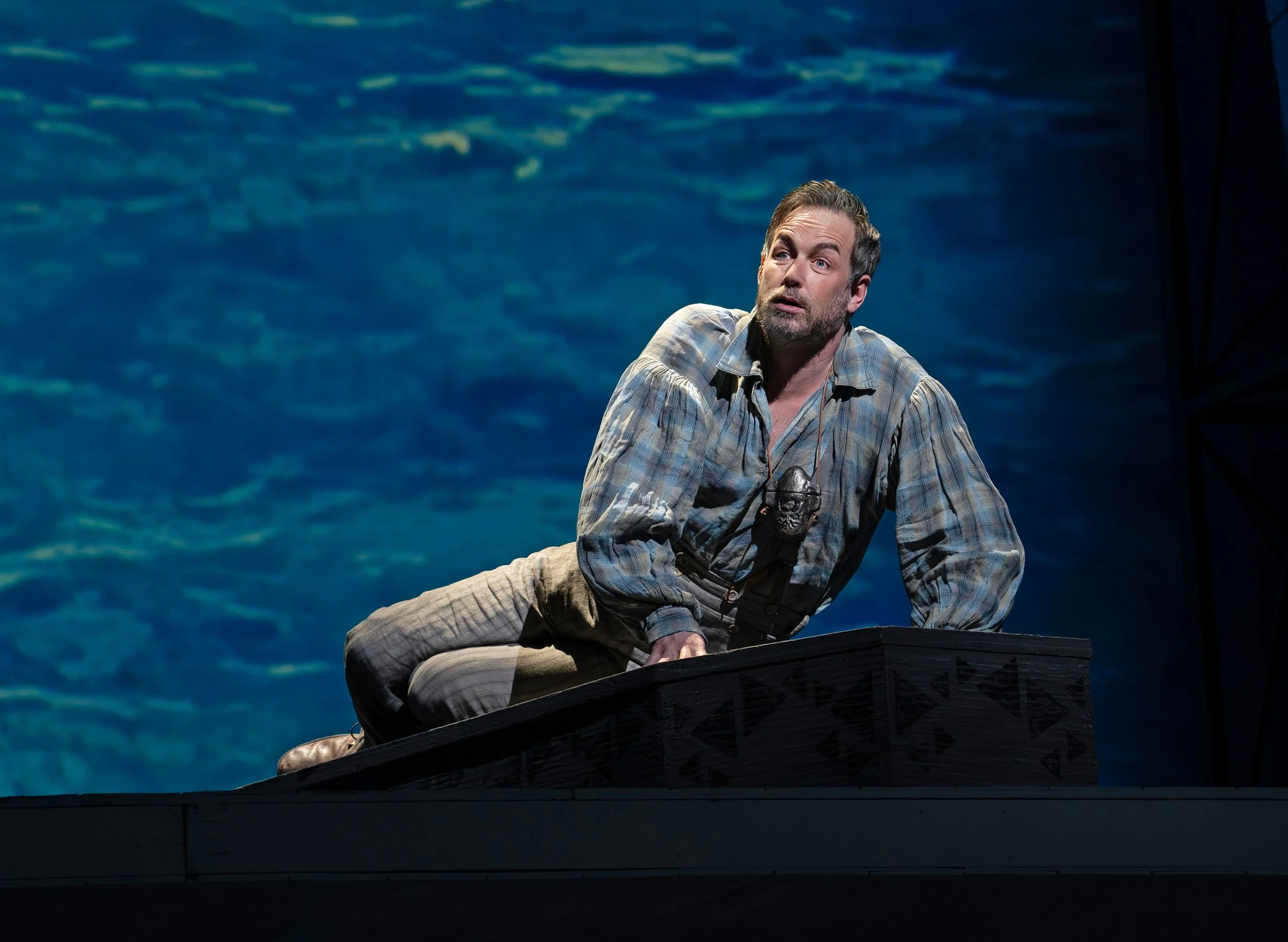Moby-Dick
Composer
JAKE HEGGIE
Premiere
THE DALLAS OPERA • 2010
Commissioned by
The Dallas Opera
San Francisco Opera
San Diego Opera
Calgary Opera
State Opera of South Australia
An adaptation of Herman Melville’s sea-drenched, heaven-storming epic. Set in 1820, the opera tells the story of Ahab, captain of the ill-fated whaleship Pequod, and the crew he commands. Having lost one of his legs to the white whale called Moby Dick, Captain Ahab is obsessed with finding and destroying him at any cost. Only the ship’s first mate, Starbuck, sees the deadly implications of Ahab’s obsession.
Dallas Morning News
“A triumph. Stunningly staged and sung, it captures the elemental forces of the sea and Captain Ahab's obsession with the great white whale that has maimed him. Scheer seamlessly tunes his own prose and poetry to Melville's. Heggie composes vocal lines that make sense vocally and illumine words and emotions.”




Photos by Karen Almond (Dallas Opera, Metropolitan Opera), Michael Brosilow (Chicago Opera Theater), Scott Suchman (Washington National Opera)
Previous Performances
The Dallas Opera, 2010
State Opera of South Australia, 2011
Calgary Opera, 2012
San Diego Opera, 2012
San Francisco Opera, 2012
Great Performances, 2013
Washington National Opera, 2014
Los Angeles Opera, 2015
The Dallas Opera, 2016
Utah Opera, 2018
Pittsburgh Opera, 2018
Opera San Jose, 2019
Chicago Opera Theater, 2019
The Metropolitan Opera, 2025
Critical ACCLAIM
— San Francisco Chronicle
Opera San Jose • 2019
“When we last encountered Moby-Dick in operatic form, this magnum opus from composer Jake Heggie and librettist Gene Scheer was embodied in the San Francisco Opera’s sweeping, majestic 2012 production. It was, among other things, a tour de force of stagecraft and visual design, which somehow managed to evoke the great watery vistas of Melville’s novel. So when Moby-Dick was announced as part of the current season by Opera San José one of the first questions was whether the magic of that epic reach could be replicated on a more modest scale. The answer was that it absolutely can — and in ways that reveal a lot about the greatness of this resourceful and beautiful work. Moby-Dick, as reconceived with imaginative fidelity by Heggie and Scheer, is still a mighty sea story, underpinned by a sense of the boredom and danger of the whale hunt. But at its heart, it remains a highly personal and intimate drama — about love and friendship, morality and duty, and the terrifying monomania of one man, the fierce Captain Ahab, possessed by demons not even he can understand. Whether the piece is made to inhabit theatrical spaces large or small, its essential tenderness and humanity shine through.”
— The New York Times
Dallas Opera • 2010
“Scheer had to pare down a leviathan novel to performable length while maintaining Melville’s grand language and moralistic tone. The obvious effort paid off. Mr. Scheer’s libretto was an economical wonder, casting off Melville’s landlocked opening and stretches of minutiae regarding whales and whaling. What remained was a taut, two-act adventure yarn, bound by relationships... An undeniable success: The end of its maiden voyage was greeted with a sustained, rousing ovation, with shredded programs fluttering down from the highest seating level. The strongest response was reserved for Mr. Heggie and Mr. Scheer, received at the end with a triumphal roar.”
— The New York Times
Metropolitan Opera • 2025
“The opening line of Herman Melville’s Moby-Dick is one of the most famous in literature. But Jake Heggie and Gene Scheer, whose moody, monochromatic 2010 adaptation arrived at the Metropolitan Opera on Monday, conspicuously avoid placing those classic three words at the start. It’s an early declaration of independence, the kind that artists have always had to make when turning a well-known novel — especially one as sprawling and shaggy as Melville’s — into singing. Heggie, who also composed the well-traveled opera Dead Man Walking (2000), and Scheer, an experienced librettist, have narrowed one of the canon’s most overflowing works to its core plot. For readers who enjoyed Moby-Dick but yawned through the rambling digressions about whaling, do I have an opera for you. The compressed adaptation is direct and clear…”
Feature Coverage
— Associated Press
A ‘Moby-Dick’-inspired opera opens at the Met
“When Leonard Foglia was invited to direct an opera based on Herman Melville’s masterpiece about a white whale, his first reaction was: “Moby-Dick. That’s great!” “Then I ran to a used bookstore and got the book,” he recalled, “and I thought: Oh my God, what am I in for here? It’s so daunting. I didn’t panic, but I thought, How do we do this?” To begin with, librettist Gene Scheer had to whittle a novel of more than 600 pages down to a 64-page libretto. He kept as much of Melville’s language as possible, and estimates that 40% to 50% of his libretto can be found in the original text, though he often tweaked the phrasing to make it more singable.”
“The marriage between literature and opera has long existed. In the classic repertoire, Alexander Pushkin’s Eugene Onegin, and Prosper Merimée’s Carmen inspired Tchaikovsky and Bizet’s respective operas of the same name, and The Lady of the Camellias by Alexandre Dumas fils became Verdi’s La Traviata. More recently, an adaptation of Michael Cunningham’s The Hours, winner of the Pulitzer Prize for Fiction, premiered in 2022 at the Metropolitan Opera in New York to great acclaim. Now, the opera house celebrates the opening of two new literary operas: Moby-Dick runs until March 29th, and The Amazing Adventures of Kavalier & Clay opens in September. Gene Scheer is the librettist who took on the formidable task of turning these beloved American classics into full-on operatic spectacles.”
— The Paris Review
How Do You Write an Opera Based on Moby-Dick?
“In some ways, Moby-Dick already has everything an opera needs: narrative drama, memorable characters, high stakes, and even the high seas. But to adapt Herman Melville’s classic text—sometimes called the most famous novel no one has ever read—into a three-hour stage production was no small feat. (Remember, after all, all those chapters in the middle about whale anatomy and theology?) We talked to librettist Gene Scheer about the process of adapting Moby-Dick into an opera—and doing the same for Michael Chabon’s novel The Amazing Adventures of Kavalier & Clay, which comes to the Met in September. We touched on the nuts and bolts of staging whaleships, borrowing from and changing Melville’s language, and the surprising similarities between opera and silent film.”
“Gene Scheer, librettist of the opera Moby-Dick, describes his creative process in representing the novel. He sees the emotional journey of Ishmael (the narrator), and the harpooner Queequeg’s influence on Ishmael as his best friend, as the soul of the novel. After working six months on his own, Scheer traveled with composer Jake Heggie to Nantucket to collaborate.”
— The Georgetowner
Washington National Opera • 2014
“An intimate marriage of music and libretto. It brings out the key elements of the heart of the book. Heggie has become something of a master of the contemporary opera musical narrative form. Just as critical is Gene Scheer’s libretto. Scheer produced a libretto that more than complements the music. It’s a marriage. Scheer finds the style and words of the characters and the time and the book, you can, as Whitman did, hear America singing, along with the Puritans and bible thumpers as well as strong-armed, brave and rum-loving sailors. Moby-Dick is an engaging American opera. It is something we’ve seen rarely here, an epic American experience, and a lodestone of inventiveness. It ends—as it should—with the right words, the right tone, the right image, just so.”
